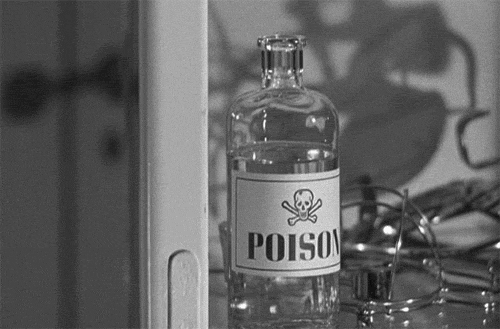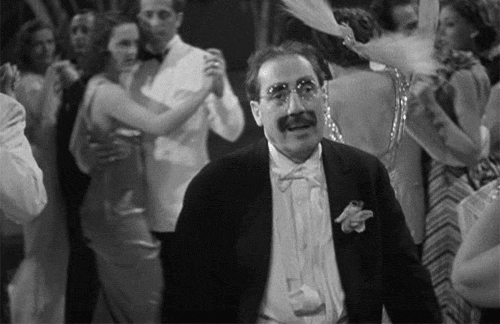Como um cavalo pode ajudar a salvar
um sanatório? Ganhando uma importante corrida. E se os envolvidos nessa corrida
forem um trio tão maluco quanto os divertidos irmãos Marx?
How can a horse save an asylum? By
winning an important race. And what happens if the ones involved in the race
are as zany as the three Marx brothers?
O médico veterinário Hugo Z.
Hackenbush (Groucho Marx) é chamado para trabalhar como médico psiquiatra (!)
no sanatório de Judy (Maureen O’Sullivan), que está à beira da falência. Na
instituição o caso mais grave é o da senhora Emily Upjohn (Margaret Dumont),
uma rica mulher que aparentemente não sofre de doença alguma. E é esse o
problema: ela quer que os médicos encontrem algo errado nela e Judy também
deseja que isso aconteça, ou vai perder sua mais rica paciente. O namorado de
Judy, o cantor Gil (Allan Jones) é dono do cavalo Hi-Hat, que se torna a grande
esperança quando surge uma corrida com um bom prêmio. Stuffy (Harpo Marx) será
o jóquei.
Veterinarian Hugo Z. Hackenbush
(Groucho Marx) is hired to be a psychiatrist (!) at Judy's (Maureen O'Sullivan)
asylum, a place about to be closed. There, the worst case is Mrs Emily Upjohn
(Margaret Dumont), a rich woman who apparently has no disease at all. And
that's the problem: she WANTS the
doctors to find something wrong with her, and so does Judy, or the richest
patient in the asylum will go away. Judy's boyfriend, Gil (Allan Jones), owns
the horse Hit-Hat, the one who becomes their only hope when a race with a big
prize is announced. Stuffy (Harpo Marx) will be the jockey.
Este segundo filme dos irmãos na MGM
repete uma tendência vista no primeiro: a inserção de um romance e números
musicais em meio à anarquia dos irmãos. A saída de Zeppo do grupo deixou espaço
para que fosse inserido um personagem menos maluco, papel aqui de Allan Jones,
que também atuou e cantou em “Uma noite na ópera” e “Show Boat” (1936).
This is the second film the brothers
did at MGM, and it has one thing in common with the first: there are a romantic
subplot and musical numbers mixed with the brothers' anarchy. Zeppo left the
group and left a space for a not-so-crazy character. Here the normal one is
played by Allan Jones, who also acted and sang in “A Night at the Opera” and
“Show Boat” (1936).
Mesmo antes de “Uma noite na ópera”
(1935) chegar aos cinemas, os roteiristas da MGM já estavam trabalhando neste
filme. Depois de serem escritos 18 roteiros, finalmente o produtor Irving G.
Thalberg permitiu que a produção começasse. Mas, duas semanas depois, ele
faleceu aos 37 anos, causando caos no estúdio e selando o destino dos Irmãos
Marx, que eram como protegidos dele. Groucho chegou a afirmar que com a morte
de Irving ele perdeu a vontade de fazer filmes.
Even before “A Night at the Opera”
(1935) premiered, the MGM screenwriters were working on this film. Eighteen
screenplays were refused, until finally Irving Thalberg approved one and let
pre-production start. But, two weeks later, Irving died suddenly at age 37.
Chaos spread in MGM and the Marx brothers' fate became darker, since they were
Irving's protegées. Groucho even said the, with Irving's death, he lost the
will of making movies.
A corrida de cavalos é o clímax do
filme, e uma longa e divertida sequência se passa no jóquei clube: quando Chico
passa uma mensagem em código para Groucho, de modo a ajudá-lo a ganhar dinheiro
apostando nas corridas. No entanto, quem fica um pouco mais rico ao longo da
cena é Chico, que vende vários livros para Groucho decifrar o código que ele
havia lhe dado.
The horserace is the film's climax,
and a long, funny sequence happens in the jockey club: it's when Chico sends a
coded message to Groucho tobhelp him to earn money betting on the races.
However, who really gets richer as the scene develops is Chico, who sells
several books só Groucho can decipher the code Chico gave him in the start.
Meu favorito entre os irmãos sempre
será Groucho, que tem excelentes momentos e frases hilárias. Com um raciocínio
que me causa inveja, ele sempre pensa numa resposta para sair das mais
complicadas situações. E olhe que o estúdio teve de enfrentar uma dessas
situações: no início da produção, o nome da personagem de Groucho era Dr.
Quackenbush. No entanto, havia 37 veradeiros doutores Quackenbush que podiam
processar a MGM, que teve de mudar o nome da personagem. Groucho acabou por
gostar da mudança, tanto que até assinava cartas como Hugo Z. Hackenbush de vez
em quando.
My favorite brother is Groucho, who
has excellent moments and hilarious lines. With a quick, envy-inducing train of
thoughts, he always has the perfect comeback for any complicated situation. And
the studio itself had to face one complicated situation: when pre-production
began, Groucho's character was named Dr. Quackenbush. However, there were 37
real doctors named Quackenbush who could sue MGM, so the studio had to change
the character's name. Groucho liked the change so much that every now and then
he signed his letters as Hugo Z. Hackenbush.
No filme há bons momentos de Chico e
Harpo, em especial durante o grande concerto de Gil, em que eles fazem uma
grande confusão. Numa das melhores cenas cômico-musicais, Harpo vai destruindo
um piano até transformá-lo em uma harpa. A MGM, berço dos maiores musicais do
cinema, inclui números musicais longos no filme. O segundo deles conta com uma
multidão de negros, incluindo a então desconhecida Dorothy Dandrige. Anos
depois, esta sequência foi cortada para a exibição do filme na televisão,
devido ao racismo.
In the film there are good moments
with Chico and Harpo, in special during Gil's big concerto, in which they make
a huge mess. In one of the best comic/musical scenes, Harpo destroys a piano
and transforms it in a harp. MGM, home of the biggest film musicals, included
several singing and dancing routines in the movie. The second of them has a
crowd of black people, including then-unknown Dorothy Dandrige. Years later,
this sequence was dut when the film was shown on TV, because it was considered
too racist.
É o mais longo filme dos irmãos Marx,
embora não chegue nem às duas horas de duração. Foi também a única produção
deles a receber uma indicação ao Oscar, de Direção de Dança, sendo que 1938 foi
o último ano em que existiu esta categoria. E para completar as honras, foi o
filme dos irmãos que arrecadou mais dinheiro da bilheteria: quatro milhões de
dólares.
This is the longest of the Marx
brothers' movie, even thought it's not two hours long. It was also their only
film to receive an Oscar nomination,in the Dance Direction category, one that
was extinct after 1938. And, to add to the records, this was the Marx film with
the highest box-office: four million dollars.
Provando o que Chico disse no filme
anterior, de que não há cláusula de sanidade (“There ain’t no sanity clause!”)
também no cinema, os irmãos fazem mais uma comédia inspirada e divertidíssima,
terminando o filme com uma frase que logo se tornaria antológica na história
cinematográfica: “Tomorrow is another day.”.
Proving what Chico had said in the
previous movie, that “There ain't no sanity clause” - the film had no sanity at
all, and in it the brothers do another fun and inspired comedy, ending the
movie with a quote that soon would become über-famous in film history:
“Tomorrow is another day”.
This entry is part of the very first Horseathon, hosted by the lovely Page at My Love of Old Hollywood













